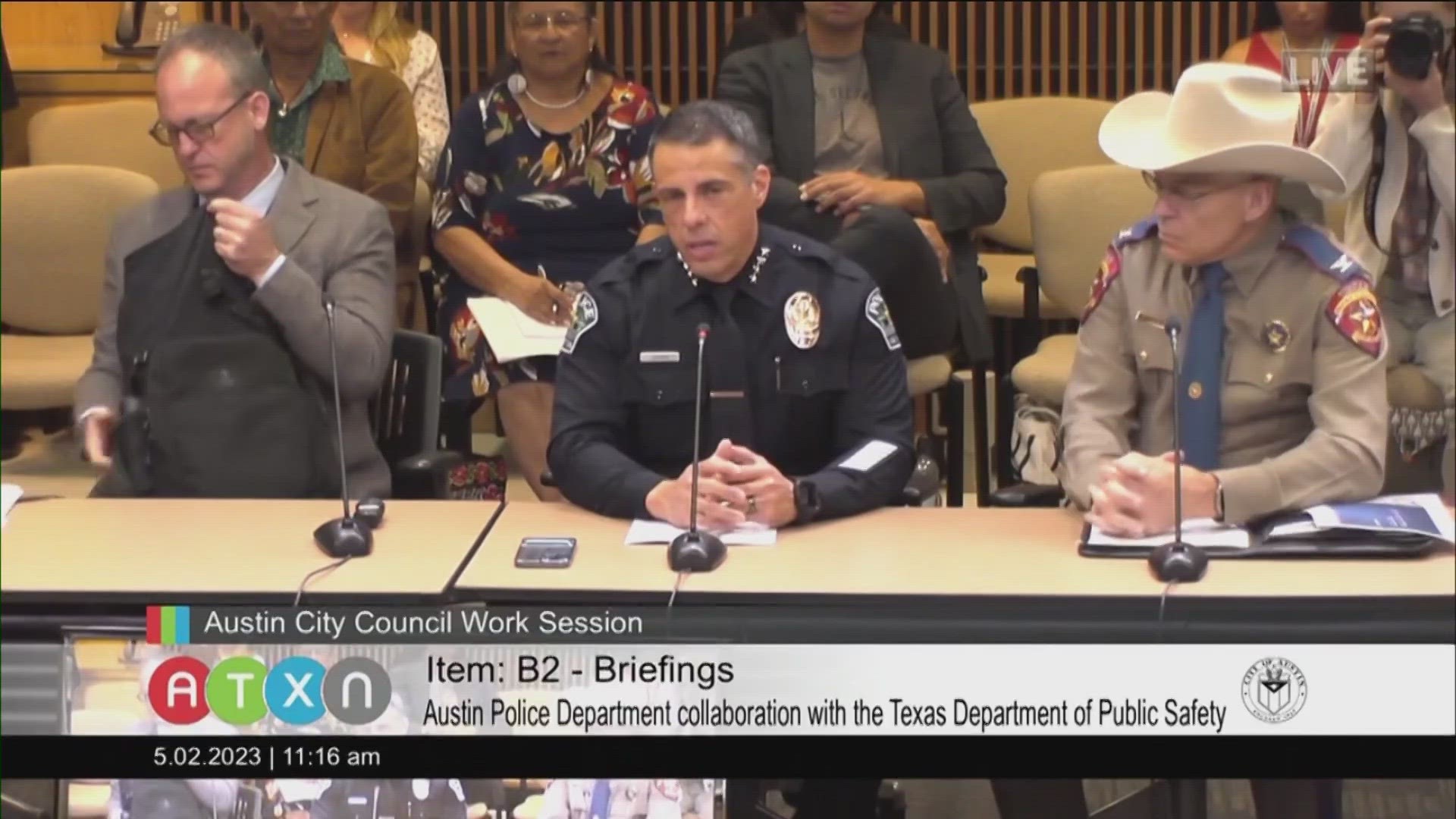AUSTIN, Texas — On May 1, the Austin City Council responded to feedback from the community and its own members on the partnership between the Austin Police Department (APD) and the Texas Department of Public Safety (DPS).
"The bottom line is that we're going to patrol where Chief [Joseph] Chicon wants us to patrol," DPS Director Steven McCraw said.
After accusations of DPS targeting minorities during their approximately 4-week partnership with Austin police, McCraw made it clear Austin Police Chief Joseph Chacon decides where they patrol.
"We will be shifting strategies," Chacon said.
During Tuesday's city council meeting, Chacon said he will be moving DPS from what's called "hot-spot policing," where they patrol areas where crime rates are historically high, to spreading troopers across the city and on more major highways.
"So that we are not having a disparate impact on our communities of color," Chacon said.
New DPS data shows the department has made just under 12,000 traffic stops in Travis County since the partnership started, when that number is typically between 17,000 and 18,000 for an entire year.
About 6% of those stops resulted in an actual arrest. The data also showed more than half of those stops were for Hispanic and Latino drivers.
"The crimes are happening in areas where there are larger populations of individuals who are of color, but by no means is DPS or APD profiling based on somebody's ethnicity or race," Councilmember Mackenzie Kelly (District 6) said. "And I think it's important to remember that but also to know that those people are also victims of crimes."
Councilmember Vanessa Fuentes (District 2) feels differently about how the partnership is going.
"What we want is people to feel safe and not targeted," Fuentes said. "There's a difference."
Fuentes is calling for less minor ticketing for things like expired tags and more for moving violations, which was the original goal.
"Really aligning this program with our Vision Zero goals, ensuring that no one is killed in a traffic accident or pedestrian fatality," Fuentes said.
Data also shows response times have improved and violent crime is down, but DPS said it's not solely because of the department. There are other factors, like the season.
"The officers being in those districts are helping protect the community and taking criminals off the street or, in some cases, citing them," Kelly said.
The City of Austin released its own data in a memo as well. Data from the partnership for the entire month of April is laid out in the memo from Interim City Manager Jesús Garza to keep with the "promise to be transparent."
"While we are encouraged by the data, we hear your questions and concerns. If there are unintended consequences to our approach, we must address them immediately," the memo states.
According to Garza, the number of violent crimes has decreased across the city. In April, there were 92 violent crimes, which is 12% lower compared to 2022 and 28% lower compared to before the partnership began.
There have been a total of 32 traffic-related deaths on Austin roads. The expansion of DPS coverage is intended to help with monitoring all major highways across Austin to hopefully prevent the city from hitting the record number of 122 traffic deaths seen in 2022.
There has also been a decline in the number of 911 calls, with only 612 emergency calls being dialed, according to the memo. This is around 17% fewer compared to last year, and 12% fewer compared to before the DPS partnership.
Furthermore, 911 response times are decreasing – they're 32 seconds faster compared to 2022 and 1 minute and 15 seconds faster with the partnership in place, according to the memo.
In addition to the City's memo, McCraw provided demographic data on the traffic stops occurring across the city.
McCraw's memo stated that of those traffic stops since the partnership began, 54.21% were classified as Latino compared to last year, which was 38.17%. The data also showed that 15.01% were classified as Black, 25.80% were classified as white and 4.63% were classified as AAPI.
According to the DPS memo, troopers were deployed to areas that were "high crime/high call hot spots" in Austin and the "percentage of DPS traffic stops during the first month of the operation are consistent with the population demographics in the area of operation."
Furthermore, McCraw stated that racial profiling is "anti-ethical to professional policing and a violation of the state and federal laws" and a myriad of procedures have been put in place to mitigate racial profiling by troopers. Some of those procedures include recording audio and video of a traffic stop; starting two minutes before activation, seeking consent to search a vehicle if there has been an observed and reasonable suspicion that the occupant is in criminal conduct; and troopers not being allowed to use verbal warnings to enforce action.
McCraw ended the memo by thanking APD for the partnership, stating, "Lastly, we are grateful for the outstanding relationship that we have with the brave men and women of the Austin Police Department."
This updated data comes one week after data from the Travis County Attorney's Office suggested that DPS troopers have been arresting people of color disproportionately compared to other groups. The County attorney's data showed that out of those arrested for misdemeanors by troopers since the partnership began 65% were classified as Latino, 23% were classified as Black, 12% were classified as white and 0.6% were classified as Asian American Pacific Islander (AAPI).
APD will provide more detailed information regarding the kinds of crimes, levels, numbers of calls and response times before the next Public Safety Committee meeting on May 22.

